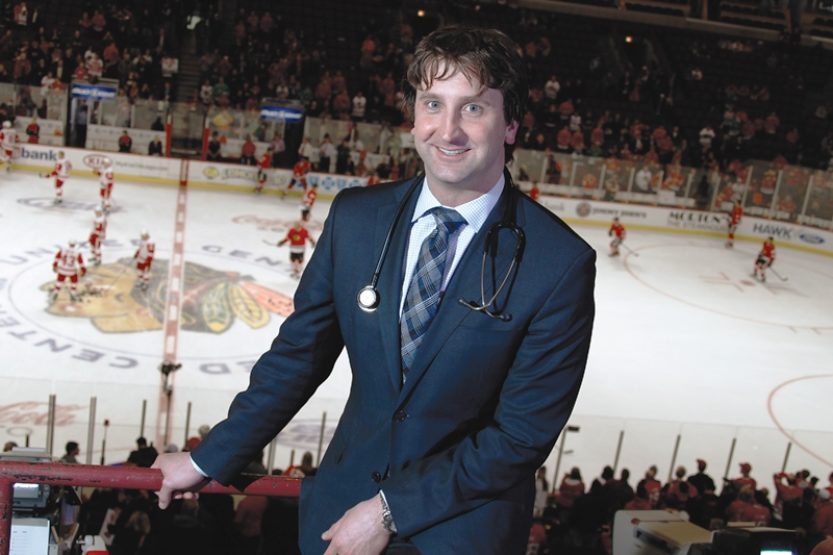The BlueLine Doctor

Deep within the bowels of the United Center, home of the Chicago Blackhawks, a mini hospital lies waiting. It’s here – hidden from the raucous crowd, the howling hotdog vendors and the rugged National Hockey League athletes – that Michael A. Terry ’94 ENG tends to the wounds borne from the hazards of hockey – the bruises and breaks, the lacerations and concussions. Hockey is a lightning-fast sport, but the 82-game season is a grind. Players are bound to smash, crash and stumble, and Dr. Terry is there to help.
“Most of the time it’s pretty quiet,” he says of his experience as head team physician of the Chicago Blackhawks. “But [when] it gets urgent, it gets urgent really quickly.
“You have to … be prepared to deal with all the large variety of things that could happen.”
Terry, 40, joined the Blackhawks in 2005 after several interviews and a fair amount of personal anxiety due to his youngish age, which he thought would eliminate him as a candidate. He is the only team doctor in the NHL who travels to every road game. (Interesting tidbit: The Blackhawks medical staff used approximately 1 mile of sutures to patch up players during the 2010-11 season.) If no accompanying physician from the opposing squad is present at the United Center, the good doctor extends his services to its players. His bedside manner puts the athletes at ease.
“Having Dr. Terry with us makes me feel safe,” explains Marian Hossa, a right wing for the Blackhawks whose rotator cuff was operated on by Terry in 2009. “We all feel like we can play and not worry when he’s around to look after us.”
Terry’s familiarity with each of the Blackhawks benefits the team. His congenial awareness of their personalities helps him recognize, for instance, when someone is “acting odd” due to concussion symptoms and needs to be removed from a game.
Then there are the frenzied moments when it’s essential for him to think and act quickly.
If two guys are cut, one of them is going to have to wait a bit, says Terry.
“It doesn’t sound like a big deal to wait a half hour to get an incision closed, but in professional sports there’s a lot on the line,” he says.
Terry credits team president and CEO John McDonough for having the foresight to make team doctors a priority. “His thoughts were, ‘We have a huge investment in these athletes, both financially and personally, and we want them to feel like we’re treating them well,’” he says.
As the NHL mandates more protocols for treating hockey players, Terry believes traveling doctors on every squad will eventually become more common.
“A lot of teams are asking us about it, especially with some of the new rules and regulations coming out,” he says.
Blackhawks fans also benefited from Terry’s medical expertise, as when he appeared as the fresh-faced physician in the “Ask the Team Doctor” segment, shown on the arena’s Jumbotron during game breaks.
“That was a fun intermission activity,” he says of the experience. “I’d look around, and you’d think people wouldn’t pay attention, but they were very interested.”
With his longish, tousled hair, a slightly distracted air and a beeper going off every 10 minutes, Terry is a doctor in demand. Besides the Blackhawks, he assists the U.S. Ski Team and USA Volleyball squad. His “daytime” job is at the Northwestern University Feinberg School of Medicine, where he is an associate professor of orthopedic surgery and performs mostly non-invasive procedures.
Long before he traveled the country with pro athletes, Terry was a mechanical engineering student on the University of Illinois campus. His additional interest in bioengineering led to a pre-med path, and Terry credits his undergraduate education with teaching him how to think critically.
“My U of I training has been as valuable as anything I’ve done since,” he says. “You can always apply engineering to problem-solving and everything else that you learn.”
Terry has vivid and enjoyable memories of his time in Urbana-Champaign; some of his current, nearest and dearest friends hearken back to those years. While at Illinois, he met his future wife,Lynne McKee ’94 BUS, as a freshman; joined the Alpha Tau Omega fraternity; and from 1992-94 served as an officer of the UI Alumni Association’s Student Alumni Association (now known as the Student Alumni Ambassadors). As an SAA member, he mentored a “little sister”-like friend, Sara Edwards Delbridge ’96 LAS, who later became his medical colleague at Northwestern. Upon graduation, Terry was tapped for Senior 100 Honorary, a UIAA program that acknowledges notable seniors.
These days, because of his duties as a team physician for Northwestern Athletics, Terry gets back to his Alma Mater on a regular basis.
“It’s really fun to see how much campus has changed and see all the students down there, the place [where] we used to live,” he says.
Lynne Terry, who formerly worked at CBS and MTV, is a full-time mother who raises three active kids, ages 9, 7 and 5. Terry makes sure to carve out family time to be with them, playing the role of dad instead of doctor, a part he enjoys.
Terry has progressed from a multi-sport athlete at Wheeling [Illinois] High School and a player on the Illinois men’s volleyball club team in 1990-91 to a well-known physician for athletes at the top of their profession. He’s used to injury-related questions, whether they come from a weekend sports warrior he meets on the streets of Chicago or an NHL superstar; such inquiries go with the territory of everyday orthopedic and musculoskeletal issues that people face.
“It’s one of the things about being a doctor,” he muses.
For Terry, a respected medical man for those in the sports-world spotlight, such questions are one of the many things about being a doctor.

